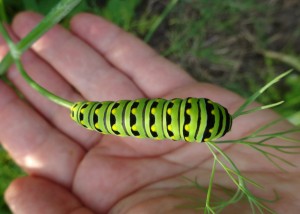 Grieving allows us to heal, to remember with love rather than pain.
Grieving allows us to heal, to remember with love rather than pain.
It is a sorting process.
One by one you let go of things that are gone
and you mourn for them.
One by one you take hold of the things that have become a part of
who you are and build again.
~Rachel Naomi Remen
Rachel Naomi Remen helped me turn toward grief instead of running from it. If your life hasn’t given you space to fully grieve, it’s not too late. Write a letter to the one you miss. Talk with a bereavement counselor or a trusted friend. Light a candle or offer flowers on a birthday or deathday. Eight years after my husband’s death, I still need Rachel Remen’s wise advice.
The Well of Grief
Those who will not slip beneath
the still surface on the well of grief
turning downward through its black water
to the place we cannot breathe
will never know the source from which we drink,
the secret water, cold and clear,
nor find in the darkness glimmering
the small round coins
thrown by those who wished for something else.
 ~ David Whyte, Where Many Rivers Meet, 2007.
~ David Whyte, Where Many Rivers Meet, 2007.
David Whyte follows grief down and in to the source of life and renewal. If we are willing to dive, we find treasures or coins in the dark, thrown by someone who, just like us, wished for a different outcome.
During the two years my husband Vic was sick, I was forced to surrender to what I did not want. Days after doctors said Vic would die within hours, he was still breathing. “Maybe he won’t die,” I said quietly to a friend who was with us. “No, Elaine. He is dying,” my friend said as he hugged me gently. Vic died forty-five minutes after our youngest son arrived at his bedside. Our son’s arrival in the dark room that night was a glistening jewel.
 I will not die an unlived life.
I will not die an unlived life.
I will not live in fear
of falling or catching fire.
I choose to inhabit my days,
to allow my living to open me,
to make me less afraid,
more accessible,
to loosen my heart
until it becomes a wing,
a torch, a promise.
I choose to risk my significance;
to live so that which came to me as seed
goes to the next as blossom
and that which came to me as blossom,
goes on as fruit.
~ Dawna Markova, from I Will Not Die an Unlived Life: Reclaiming Purpose and Passion
Ethereal wisps of joy, curiosity, and hope pulled me toward life. After absorbing the rawest grief, it was time to find new life. That meant taking risks. It mean a defiance toward grief, a will to live even if it hurt. I held my fear close like a wounded child and began searching. If I hadn’t cast seeds, many of which did not sprout, there would be no blossoms or fruits today. I had promised Vic I would find a way to have a good life on my own. I had promised myself.
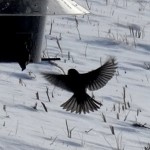 Bird Wings
Bird Wings
Your grief for what you’ve lost lifts a mirror
up to where you’re bravely working.
Expecting the worst, you look, and instead
here’s the joyful face you’ve been wanting to see.
Your hand opens and closes and opens and closes.
If it were always a fist or always stretched open,
you’d be paralyzed.
Your deepest presence is in every small contracting
and expanding,
the two as beautifully balanced and coordinated
as bird wings.
~ Rumi
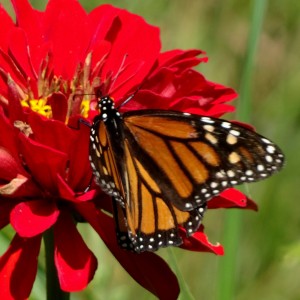 The image of the opening and closing hand reminds me of a butterfly slowly beating its damp wings after emerging from the chrysalis. Rumi helped me feel the love within grief. He helped me feel the gratitude that arose when I softened my grip.
The image of the opening and closing hand reminds me of a butterfly slowly beating its damp wings after emerging from the chrysalis. Rumi helped me feel the love within grief. He helped me feel the gratitude that arose when I softened my grip.
I had the idea that the world’s so full of pain
it must sometimes make a kind of singing.
And that the sequence helps, as much as order helps—
First an ego, and then pain, and then the singing.
~ Robert Haas (“Faint Music,” in Sun Under Wood: New Poems (Hopewell, N.J.: Ecco Press, 1996), 41.)
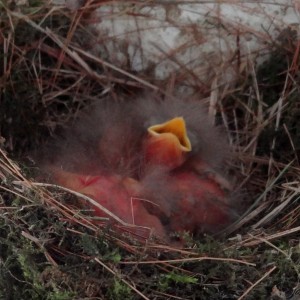 Vic loved these lines and so do I. Our personal pain becomes part of a universal human lament, a chanting, a deep Aum that vibrates with the universe. And the sequence matters. First the ego’s suffering, then a recognition of our pain, and finally a celestial song.
Vic loved these lines and so do I. Our personal pain becomes part of a universal human lament, a chanting, a deep Aum that vibrates with the universe. And the sequence matters. First the ego’s suffering, then a recognition of our pain, and finally a celestial song.
***
My blog Poems to Grieve By has been my most popular post for years. Today, I share five more poems that helped me along the way. I’d love to know about poems that helped you face grief or move forward in life. I also recommend an illustrated version of Rumi’s poem The Guest House by Gavin Aung Than who manages to be both respectful and hysterically funny. Have any of the characters in his drawings arrived at your guest house?
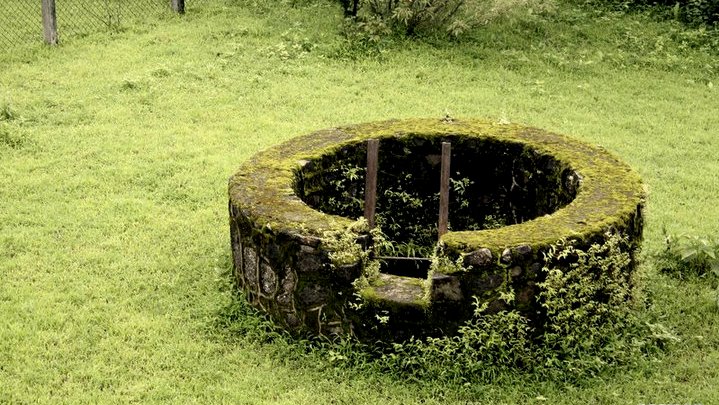
Dear Elaine, This is such a beautiful poignant post! Thank you so much for sharing more soothing poems of hope and solace with us. Each and every line of your selected poems, opens the eyes of the heart. As a poet I’ve been greatly moved by many poems, yet today for some reason I’ve found myself reading Pablo Neruda’s ‘Tonight I Can Write (The Saddest Lines)’ over and over again. Language will fail me miserably if I try to describe how this poem affects me, so I’ll leave the poem below for others to delight in.
See how your own lyrical words shine, and shimmer dear poet! For all through your articles, and wonderful book, you write with the mystic hand and heart of the poet. Oh my goddess! How my heart leaps in joy to discover the glistening jewels you leave upon many a page. Thank you dearly for scattering your beautiful seeds afar, I do believe they’ve sprouted in many a heart. I will leave Neruda’s poem here for others to delight in. Bright spring wishes, Deborah.
Tonight I Can Write (The Saddest Lines) by Pablo Neruda
Tonight I can write the saddest lines.
Write, for example, ‘The night is starry and the stars are blue and shiver in the distance.’
The night wind revolves in the sky and sings.
Tonight I can write the saddest lines.
I loved her, and sometimes she loved me too.
Through nights like this one I held her in my arms.
I kissed her again and again under the endless sky.
She loved me, sometimes I loved her too.
How could one not have loved her great still eyes.
Tonight I can write the saddest lines.
To think that I do not have her. To feel that I have lost her.
To hear the immense night, still more immense without her.
And the verse falls to the soul like dew to the pasture.
What does it matter that my love could not keep her.
The night is starry and she is not with me.
This is all. In the distance someone is singing. In the distance.
My soul is not satisfied that it has lost her.
My sight tries to find her as though to bring her closer.
My heart looks for her, and she is not with me.
The same night whitening the same trees.
We, of that time, are no longer the same.
I no longer love her, that’s certain, but how I loved her.
My voice tried to find the wind to touch her hearing.
Another’s. She will be another’s. As she was before my kisses.
Her voice, her bright body. Her infinite eyes.
I no longer love her, that’s certain, but maybe I love her.
Love is so short, forgetting is so long.
Because through nights like this one I held her in my arms
my soul is not satisfied that it has lost her.
Though this be the last pain that she makes me suffer
and these the last verses that I write for her.
Deborah, you make me blush. I’m also honored by your words, beautiful mystical poet of love that you are. There are so many poems I could have shared. I began with ten and whittled to make what felt like a narrative with the poems as skeletons. I also didn’t share anything long.
I do not know this Neruda poem, although I know some others by him. My Hispanic friend reads Neruda to me in Spanish (which I don’t speak) and then in English. The words sing in Spanish. This exquisite poem makes me realize once again the huge world of poems and prose–so many I will never find. But you’ve brought this beauty to me today. I love how the mystery of love and mystery of time and memory are expressed. “I love her. I no longer love her. Sometimes I loved her. Maybe I love her. Love is so short, forgetting is so long.”
Deborah, when we meet someday, I hope you will read me many poems. With love and gratitude, Elaine
♥
Thanks for the love, Marty.
Your wisdoms and beautiful poetry are truly touching Elaine. Your life experiences and grief process has helped you become the teacher for those who seek enlightenment when they walk the path that you have. And some great enlightenment for all who will some day face those same challenges. You are a warrior. 🙂
Thank you, Debby. I’m glad to share what I’ve learned and what others have generously shared with me. Enlightenment is an ultimate goal after years of meditation, study, and sitting with spiritual teachers. I’m nowhere close to what that big word means, but I’ve learned something through living the lessons I’ve been given. Thank you for your kind words and for your work of turning life’s lessons into something valuable. I hope things will ease in your world soon.
Thank you Elaine. <3
Thank you for reading. I hope the poems were helpful.
I will be emailing this post to two dear friends of mine Elaine who have suffered the deaths of their husbands, one by suicide and one after a long illness. I hope too that they read Deborah’s Pablo Neruda poem -Your selection is very beautiful and very very powerful thank you. As are your words, poetry too…
Thank you, Susan. I love the poems I wrote about in “Poems to Grieve By” (the link is at the bottom of the article) for the raw feelings of early grief, so these might be suitable, too. In both cases, I shared poems that most resonated with me and women in my bereavement groups.
Poetry is the genre we reach for when we are in love and when we are in pain.
I’ll never forget how often poems were used, for example, at the 9-11 memorial events.
You also demonstrate that poetry continues to speak to the grieving soul, both in the raw immediacy of the loss and in the years to come.
May you both find your own comfort and help others do the same, Elaine. You have found your calling.
It is, Shirley. My marriage began and ended with poetry. In 1966, Vic and I sat together on his couch while he read me poems from Walter Benton. On our last wedding anniversary about two weeks before he died, I read Vic love poems, including our favorite from Walter Benton which he had read to me 42 years earlier. I use poems in workshops, presentations, and bereavement groups. In book readings, the feelings are right when I include the poem “Kindness” by Naomi Shihab Nye, reprinted with her generous permission in my book. In early grief, I needed a reflection of my raw longing and confusion. More gentle poetry needed now. Thank you for your encouraging words, Shirley. I’m taking them in.
Wonderful post, Elaine. The part about going into grief, instead of running away from it, spoke to me. I suddenly had a new insight. Coupled with grief comes fear of the pain grief entails — there are two major emotions at once.
Thank you, Ann Marie. That’s been an essential idea for me, Ann Marie. Trying to avoid pain has become natural for modern people who imagine a pain-free life, but our ancestors turned grief into a spiritual experience. Soon after Vic died I was so deeply immersed in sorrow that I feared I would never surface again. But I kept perspective and remembered the women in war zones or in natural disaster who lost their children, their husbands, their homes, their history, everything. I knew I was experiencing “ordinary” grief. When I stayed with my feelings and felt my longing, I also felt deep love and gratitude.
Thank you for all the poems, Elaine. And I LOVE Rumi’s THE GUEST HOUSE. Also, your illustrations/photos are magnificent. What is it about “grief poetry” that makes it so beautiful? Do you think it’s the hope?
Big questions, Robin. Yes to hope. Maybe it’s also about placing grief in a “sacred” context where it traditionally resided. Not religious in terms of any one tradition (although some poems do that), but universal images that touch heart and soul where grief resides even if we don’t consider ourselves spiritual. I love “The Guest House,” too, and love these illustrations.
Beautiful, Elaine. As you know, we share a love of poetry–and Mary Oliver in particular. I used the Guest House by Rumi in my book and still hold it as one of the most profound poems on grief every written–without being about grief:) Much love to you, Therese
Thank you, Therese. Yes, we share a love of poetry and much more. I’d forgotten you used “The Guest House” in ‘The Promise,’ but just re-read that chapter. Whew! That was a tumultuous testing time for you. I’m glad you found a way to heal. I’ve tried so many ways to help my body cope with Meniere’s Disease and deafness and to understand the esoteric meaning. Some have helped and many have not. In your case and in mine, we have to settle in for prolonged visits from difficult guests and do all we can to encourage healing. Much love back to you.
Yes, wonderful post. I agree with you, and all the poets. David Whyte illustrates for us that we can breath deeply even when we feel breathless. That there is fruit to eat when your hunger is for something even deeper than food. Neruda– I read this poem and now want to run to kiss my wife. I think I’ll do that now.
Kissing your wife after reading Neruda is the best and wisest choice–and I’m laughing. Thanks for your other comments, too, Ira.
My contribution from poet David Whyte whom I just now saw quoted: “Sometimes it takes darkness and the sweet / confinement of your aloneness / to learn / anything or anyone / that does not bring you alive / is too small for you.” It doesn’t quite fit with the theme here, but it seemed to call to me. Perhaps you may feel the same.
Your life with Vic enlarged you in ways that now enable you to live in a larger world. I see your influence expanding in wider and wider ripples.
It fits with the theme, Marian. Thank you. David Whyte expresses human truths in a language we all hear.
Vic’s death tossed me into a new life and it was my job to make it work. My ripples are small, but it is nice to watch them move in various directions.
Elaine, thanks so much for pointing me to this page, which I have visited 3 times and read fully each time. It’s a beautiful expression. I think the poem that has helped me in grief is this one following. A friend said that her grief was so big that nothing but the outdoors was big enough to contain it for a while…the night sky, the glorious day were her only real comforts…maybe that’s what drew me to this poem.
From Blossoms
From blossoms comes
this brown paper bag of peaches
we bought from the boy
at the bend in the road where we turned toward
signs painted Peaches.
From laden boughs, from hands,
from sweet fellowship in the bins,
comes nectar at the roadside, succulent
peaches we devour, dusty skin and all,
comes the familiar dust of summer, dust we eat.
O, to take what we love inside,
to carry within us an orchard, to eat
not only the skin, but the shade,
not only the sugar, but the days, to hold
the fruit in our hands, adore it, then bite into
the round jubilance of peach.
There are days we live
as if death were nowhere
in the background; from joy
to joy to joy, from wing to wing,
from blossom to blossom to
impossible blossom, to sweet impossible blossom.
Copyright © 1986 by Li-Young Lee. BOA Editions Ltd., http://www.boaeditions.org.
How beautiful, Kim. Thank you for taking the time to read, comment, and share this poem. I love many of Li-Young Lee’s poems and heard him read in person once. You remind me to read more of his work. At least two of his books are on my shelf.
Depending on what pieces you’ve read, you’ll know that being outside was the only thing that truly soothed my grief. I felt fortunate that my husband died in June because when I returned home the fields were purple-blue with thousands of flowering lupines. How could I deny life’s beauty? Then, as I took three or so walks a day with my dog, the summer unfolded with birds, butterflies, and constantly changing flowers. I watched them all burst forth and wither in Nature’s cycle of living and dying and knew I was experiencing what all living things experience. Everything that begins must end. Nature helped me know life was still glorious and I’d find a way to go on.
I’m not sure exactly what this is but I love it! I think these are reposts of Elaine’s blog, right? Ive held grief for many things in my life for 51 years. I’m finally beginning to release it and oh the pain….these poems and comments are helping. Where can I find more? Much love to you Lori Hodo
Hi Lori, You landed on my blog. You don’t seem to quite know how you got here, but I welcome you. 51 years is a long time. I hope you have lots of support in releasing that pain. The most popular blog I’ve written about poetry is “Poems to Grieve By” (https://elainemansfield.com/2013/poems-grieve-love-loss-continuing-bonds/). You might also like an article called “Only Kindness Makes Sense” using Naomi Shihab Nye’s poem “Kindness.” (http://thescheherazadechronicles.org/contributors/only-kindness-makes-sense/) I hope you can be very kind to yourself as you face the grief you carry. I think it’s the most important thing we can give ourselves and each other. I also hope you’ll find other pieces I’ve written about grief that will help you move through this time and emerge healed.
Warmly, Elaine
Hi Elaine,
I have the good fortune to be on holiday in Corfu with my two of my teenage children (who sleep in late). Eighteen months ago my husband of 24 years decided to leave me, I’ve been sitting outside in the early morning warmth, thinking and writing. This morning, I looked up a Rumi poem, and fell across your blog which I’ve found really helpful.
I know that this isn’t your experience, but do you (or any of your readers) have any thoughts on grief following divorce?
This type of grief brings with it, not only the devastating loss of, in my case, my husband, but also the knowledge and sheer pain of the fact that my husband (who committed to loving me), no longer loved me, or wanted me to be part of his life. I was driven away by, and from him.
Grief following death is widely (and rightly) recognised, but my feeling is that loss following divorce is not recognised as having the same depth of grief, and the loss is further added to by that fact that your partner chose to leave, and thereby inflict injury.
I have so many lovely memories, but I don’t know how to look back on them, and know how to cherish them or carry with me in a positive way. They seem tainted now, because I don’t know if they were genuinely happy for both of us.
I am familiar with some of the work of Rumi, and more so Mary Oliver who’s work I love, and am looking forward to reading back though what you and others have written, and looking up the poems etc.
Jess, I’m so sorry you’ve had to suffer this. The husband of one of my closest friends left her while my husband was dying. I felt her experience was harder than mine. She had to deal with a purposeful banishment, withdrawal of love, and unwillingness to work through the rough spots that arise in relationship. Their issues felt “fixable,” but not if he didn’t want to. In the case of a death, destiny takes charge and at some point it’s out of our hands. Catastrophic illness puts a big strain on a relationship, too, but we’d had a lifetime of working through psychological issues together.
Have you searched around for writers about divorce and grief? I’m sorry I don’t know those articles, but they must be out there. I found a few possibilities on Modern Loss: https://modernloss.com/tag/divorce/ I also hope you have someone who can walk with you through this on-going transition. I began seeing a therapist just before my husband died and still see her once or twice a month. I’m not in deep grief anymore but have had other losses along the way. I need to explore my dreams with someone and need the experience of being seen. Wishing you well in every way.
I am sorry I don’t have resources for you, but I can say that in the wake of my divorce 8 years ago I also felt a void of material honoring the death of a marriage. It is a loss of a different character for all the reasons Elaine also outlines in her reply. I found the lack of ritual most challenging. No funeral, no burial, often the ongoing slow-severing of legalities or custody or re-exposure at shared family events… It is not clean and tidy and done — although I suppose all loss rarely is. I would encourage you to look for ways to make ritual. My first husband and I had a tree in our yard for 17 years that we called The Wedding Tree because it grew from a seed from a pinecone that had been placed in a wreath at our wedding. A year or so after he left, my 5 children and I chopped it down and burned it in a bonfire. I was afraid this would be traumatic for them, but it was a ritual that was meaningful, although brutally sad, for all of us. I still have a poor relationship with my first husband but it helps me to mark annually some of those same dates you might still mark with a death — only it is the date he left, the date of the divorce being final… I do not mark them in sorrow anymore or even for the couple we were, but more to recognize the profound impact they had on me and the woman I am today. It is very hard to learn to integrate what was good and true about a lost marriage and to let go of what is forever stained. I am so deeply sorry for your loss and pain.
Betsy, thanks for your reflections. I haven’t had personal experience with divorce but I often observe that divorce can be harder than a death–and it’s even less supported by our culture. There was no betrayal or intent in the end of my marriage. Just mortality doing what it does. My husband would have stayed if he could have. I agree that with divorce, there is usually no ritual, no funeral, no closure.
Perhaps you haven’t read anything I’ve written other than this piece or haven’t listened to my TEDx talk (not that you should, but it has a strong focus on ritual). I write about ritual often (here are some of those pieces, although there are many more scattered through my blog: https://elainemansfield.com/tag/grief-ritual/). I include ritual with every workshop or hospice bereavement group I lead. I’m giving a two hour workshop specifically about ritual in a few weeks. One of those hours will be devoted to creating a ritual together to honor our losses–people, pets, jobs, marriages, homes, health or whatever comes up for the people who attend. I’ve helped create rituals for friends who lost jobs or had divorces or big changes in life circumstances. I trust the healing power of ritual and encourage people to create personal rituals including readings and actions that are meaningful to them.
My sons and I buried my husband’s ashes under a red oak in our forest (as my husband requested) and built a cairn on top (my sons’ idea). For many years, I walked to this site every day, sometimes more than once a day that first summer, and took offerings and prayers there. It’s been 10 years since my husband died and there have been other losses–my brother’s death and my own hearing loss and more. I create rituals for these losses, too, sometimes alone and sometimes with friends. My body reminds me of other important times in my 42 years with my husband–the day he proposed, our wedding, when our sons were born, his cancer diagnosis, traumatic medical moments before his actual death. I’ve written about much of it in my book and in blogs.
I love your story of The Wedding Tree. I can’t imagine how powerful it might have been to chop down a living tree. I’m glad it was healing for you and your kids. I love your explanation of ritual remembrance as more than sorrow, but as honoring the profound changes we go through in life. Finally, I honor you the way you’ve transformed your pain.
Dear Elaine,
I just stumbled over the wonderful collection of poems you shared amidst the grief following Vics departure. Thanks for that – it touches me deeply.
Amidst the comments I found Neruda, whom I happily share below, remembering my student years in Chile, years that left many deep traces.
Also, I found the comments concerning the pain following separations and divorce, mainly shared by women „abandoned” by their once beloved.
I can relate to that also and find solace in Nerudas poem which lets the pain of separation glitter from both sides: the pain of the one who felt abandoned and the pain of the one who moved on.
A ritual to put an end to the pain of separation?
I trust that somewhere that pain is on both sides: both the one abandoned and the one who moved on will find it presently.
How wonderful if that could be acknowledged and shared in a shared life review – I know that it is possible if we can move on from judgment and learn the lessons of what’s painful in gratitude.
Easier said than done?
Undoubtedly!
Here’s Neruda in Spanish
PUEDO escribir los versos más tristes esta noche.
Escribir, por ejemplo: “La noche está estrellada,
y tiritan, azules, los astros, a lo lejos”.
El viento de la noche gira en el cielo y canta.
Puedo escribir los versos más tristes esta noche.
Yo la quise, y a veces ella también me quiso.
En las noches como ésta la tuve entre mis brazos.
La besé tantas veces bajo el cielo infinito.
Ella me quiso, a veces yo también la quería.
Cómo no haber amado sus grandes ojos fijos.
Puedo escribir los versos más tristes esta noche.
Pensar que no la tengo. Sentir que la he perdido.
Oir la noche inmensa, más inmensa sin ella.
Y el verso cae al alma como al pasto el rocío.
Qué importa que mi amor no pudiera guardarla.
La noche está estrellada y ella no está conmigo.
Eso es todo. A lo lejos alguien canta. A lo lejos.
Mi alma no se contenta con haberla perdido.
Como para acercarla mi mirada la busca.
Mi corazón la busca, y ella no está conmigo.
La misma noche que hace blanquear los mismos
árboles.
Nosotros, los de entonces, ya no somos los mismos.
Ya no la quiero, es cierto, pero cuánto la quise.
Mi voz buscaba el viento para tocar su oído.
De otro. Será de otro. Como antes de mis besos.
Su voz, su cuerpo claro. Sus ojos infinitos.
Ya no la quiero, es cierto, pero tal vez la quiero.
Es tan corto el amor, y es tan largo el olvido.
Porque en noches como ésta la tuve entre mis
brazos,
mi alma no se contenta con haberla perdido.
Aunque éste sea el último dolor que ella me causa,
y éstos sean los últimos versos que yo le escribo.
Here’s Neruda reading it personally:
https://web.uchile.cl/neruda/videos/poema20.mp3
Thanks once again,
Helmut
Thank you, Helmut. I love Neruda. A woman friend who is a native Spanish speaker reads his poems out loud in Spanish before reading in English. You’ll mostly find comments from women, because in my limited experience, it’s mostly women who make comments on blogs even if the writer is a man. I found a translation of the poem in English since my hearing is damaged.
Ritual has never ended the pain of separation for me–or for anyone, as far as I know. It keeps the pain and the longing conscious, and this is a way I stay in contact with my love for Vic. He also shows up often in dreams. We were honest about our mutual grief and talked about our dreams and his visions. I read love poems to him until the last days. Grief kept our hearts open to the human condition and it’s the price of love. Vic grieved over leaving me, but I think it was even harder to have his last book come out just 3 months before his death. The Dalai Lama asked him to write this book and Vic tried so hard to support the book for the Dalai Lama and present the ideas to interested people. It wasn’t his destiny to have that last wish fulfilled.
I’m grateful for our loving marriage and all we shared and learned from each other. His dying days were sacred. When Vic died, it felt like he was moving on with great speed after his long illness. It was clearly time to go! And I miss him every day. Blessings to you.
Dear Elaine, so nice to read your thoughtful response!
I carried the reading of your poems with me all day. It coincided with the second day of a very inspirational four-day palliative care seminary we are enjoying.
Today coincidentally (?) we were confronted with the ways we experience grief.
Synchronicity: wasn’t that one of Vic’s themes?
I’ll ponder over your observation that blog postings are usually made by women.
After all, the themes you touch are undoubtedly relevant to both women and men.
So long for now, and thanks once again,
Helmut
About comments made by women vs men, it depends on the content, but there’s no doubt most of my commenters are women. I have a few men who are regular commenters–and some comment by sending private emails.
Vic was gifted with synchronicity experiences which led him to study Jung and Eastern religions–and write a book about Synchronicity. These experiences were obviously more than coincidence, so as a scientists, he had to explore. The last dream he had (just a few days before death) was: “The Spanish King has died and I don’t know about it yet.” He was too exhausted to say more. I understood the king or the Self would die soon, but why Spanish? Months later, I saw a Jungian analyst and dream therapist Robert Bosnak who knew Vic. I told Robert about the dream and the mystery of the Spanish king. Robert likes making dreams experiential and not doing much interpretation, but about 15 minutes later, he said to me: “I think the king was Spanish, because in European history, Spanish kings were interested in exploring new worlds. The dream was telling Vic he was done exploring new worlds.” I knew that was it. Vic didn’t want to live if he couldn’t keep exploring new ideas.
Palliative care is a wonderful help for so many and we should all know about it. I wrote a few articles for my hospice about the benefit of palliative care.
Thank you for sharing these beautiful poems and the ways you’ve managed your grief through the years, Elaine. Listen to the voice of poetry is surely the most soul-satisfying path to accepting, exploring, soothing, and healing terrible grief. I attended the Episcopalian funeral mass of a dear friend yesterday and am still under the spell of its timeless poetry today. I will remember that the next time I’m grieving a loss, and I will visit your site first when I’m looking for just the right poem that that touches the inexpressible.
Thank you, Jeanie. I’m glad you went to a funeral mass that moved you. I’ll always remember how “dead” and irrelevant my father’s funeral service felt when I was a kid–and the Unitarian officiate had never met my dad. Poetry, music, ritual, and spiritual community make all the difference, and we had none of those when I was a child. When Vic died, I could choose poetry and readings he loved, plus ones that were important to me. It makes me happy to think these poems can lift others the way they’ve lifted me. Blessings to you in the warmth and green of Florida.